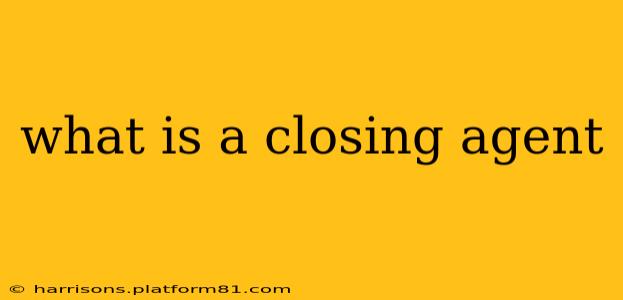Buying or selling a home is a significant life event, often filled with excitement, anxiety, and a lot of paperwork. Navigating this complex process smoothly relies heavily on the expertise of a closing agent. But what exactly is a closing agent? This comprehensive guide will demystify their role and answer all your burning questions.
A closing agent, also known as a settlement agent or escrow agent, is a neutral third party responsible for handling the financial and legal aspects of a real estate transaction. They act as a liaison between the buyer, seller, lender (if applicable), and other parties involved, ensuring all the necessary documents are prepared, reviewed, and signed correctly before the transfer of ownership. Their primary goal is to facilitate a smooth and legally sound closing process.
What Does a Closing Agent Do?
Closing agents handle a multitude of tasks, including:
- Reviewing and preparing closing documents: This includes the purchase agreement, deed, mortgage (if applicable), title insurance policy, and other relevant paperwork. They meticulously check for accuracy and ensure all parties understand the terms.
- Disbursing funds: The closing agent receives and distributes funds from the buyer to the seller, lender, and other relevant parties according to the terms of the agreement. This includes handling earnest money deposits, down payments, loan proceeds, and any other necessary funds.
- Managing escrow accounts: They manage escrow accounts, holding funds in trust until the closing date to ensure that money is disbursed safely and correctly. This is crucial for protecting the buyer and seller's interests.
- Handling title insurance: They often work closely with title insurance companies to ensure the property's title is clear of any liens or encumbrances. This process safeguards both buyer and seller from future title disputes.
- Coordinating the closing process: They act as a central point of contact, coordinating the efforts of all parties involved to ensure a timely and efficient closing. They schedule the closing, gather necessary documents, and answer questions from all parties.
- Explaining closing costs: Closing agents clarify the various fees and costs involved in the transaction. They will provide a detailed closing disclosure, breaking down each expense to ensure transparency and understanding.
Who Is a Closing Agent?
The specific title and responsibilities of a closing agent can vary slightly depending on location and legal jurisdiction. In some areas, they are real estate attorneys, while in others, they may be licensed escrow officers or title company employees. Regardless of their specific title, their neutrality and expertise are essential for a successful closing.
What are the Differences Between a Closing Agent, Escrow Agent, and Title Agent?
While the terms are often used interchangeably, there are subtle differences:
- Closing Agent: This is a general term encompassing the overall role of handling the financial and legal aspects of the closing.
- Escrow Agent: This agent typically manages the escrow account, holding funds in trust until the closing. They are often part of a larger closing process but may not handle all aspects.
- Title Agent: Focuses specifically on examining the property's title and ensuring it's free from liens or other issues. They usually work in conjunction with a closing agent.
Often, one individual or company will fulfill multiple roles in the closing process.
How Much Does a Closing Agent Cost?
The cost of using a closing agent is usually included in the closing costs, which are typically split between the buyer and seller according to the terms of the purchase agreement. These costs vary depending on location, the complexity of the transaction, and the specific services provided.
What are the Benefits of Using a Closing Agent?
Utilizing a closing agent offers several key advantages:
- Expertise and knowledge: Closing agents possess in-depth knowledge of real estate law and procedures.
- Neutrality: Their unbiased role protects the interests of both the buyer and seller.
- Efficiency and organization: They streamline the closing process, reducing stress and potential delays.
- Reduced risk of errors: Their meticulous attention to detail minimizes the risk of legal or financial issues.
In conclusion, a closing agent plays a vital role in ensuring a smooth and successful real estate transaction. Their expertise and impartiality are invaluable, guiding both buyers and sellers through the complex process with confidence and efficiency. Understanding their role empowers you to navigate the home buying or selling process more effectively.
